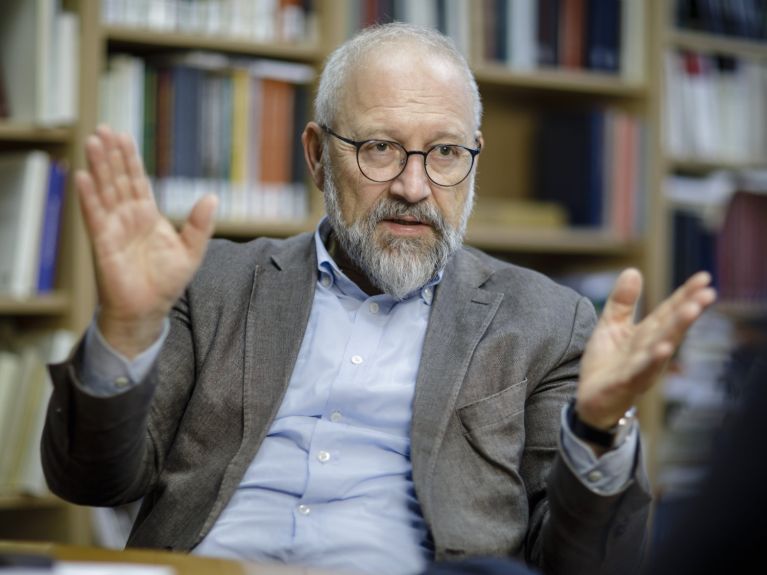“We cannot watch what is happening with equanimity”
Political scientist Herfried Münkler in an interview regarding the Germans’ relationship with their Nazi past – and the resulting lessons that are still relevant today.

Professor Münkler, how would you explain to a young person, in just a few sentences, what caused the Second World War?
There were some powerful groups in German society that wished to revoke the border changes that had been implemented after the First World War, i.e. they wanted to amend the 1919 Treaty of Versailles. On 30 January 1933 they formed a political coalition with the NSDAP, though the Nazis were not only interested in restoring the German Reich with the same borders that had been in place in 1914 but also aspired to considerable territorial gains in the east with a view to relocating German farmers there in order to “Aryanise” the region. To this end, the Jews living there were initially to be driven out and later annihilated. Ultimately, it was also about access to resources that were likewise to be brought under German control. From a German perspective, it was thus a mixture of a revisionist war and a large-scale war of conquest and extermination. This melange is important when it comes to understanding the different ways in which the war was viewed after 1945.
To what extent was the end of the Second World War both a liberation and a defeat for Germany?
The perception of it being a “liberation” relates to the end of the Nazi regime, which ever since the tide began to turn in the war in 1942/43 had been murdering not only the political left, Jews, Sinti, Roma and the disabled, but anyone who opposed it. The perception of it being a “defeat”, on the other hand, related above all to the war itself and the fact that the number of Germans killed between the early summer of 1944 and 8 May 1945 was as high as in all the previous years of the war combined. Given the division of Germany and the “loss of eastern territories”, the idea of it being a defeat rather than a liberation predominated for a long time in West Germany. In the Soviet occupied zone and the GDR , by contrast, the surrender was officially depicted early on as a liberation by the Red Army of those Germans who were not staunch Nazis. In the West, the idea of the liberation was not politically imposed on people but evolved gradually from the late 1950s among the political left and gained traction as prosperity grew.
The idea of it being a defeat rather than a liberation predominated for a long time in West Germany.
What role was played by historians and intellectuals in the decades after 1945 when it came to critically appraising the country’s Nazi past?
Some portrayed the war as a “defensive battle” against the “red tide” from the East and highlighted the way the German population suffered. They tended to be authors on the right of the political spectrum. Though the crimes of the Wehrmacht and the SS in the East were known about, they were long marginalised. By contrast, some historians and intellectuals emphasised the German policy of conquering and oppressing people in Europe and explored the connection between annihilating the Jews and the war. Until the early 1980s, this contrary view served as a dividing line that distinguished the “right” from the “left” in West Germany. In this sense the exhibition of the crimes of the Wehrmacht marked a turning point because it was then no longer possible to make any fundamental distinction between the allegedly “clean” Wehrmacht and the criminal SS.
Some people believe the commemoration of the victims of the Nazi regime and of the Holocaust in Germany to be ritualised and thus depoliticised. Do you share this view?
Ritualisation, which can be the result of commemorative ceremonies that are repeated every year, can easily lead to a certain “dulling” of emotion. I wouldn’t describe this as depoliticisation but rather as a growing indifference brought about by ritual repetition. It is important to think about what can be done to counter this. That is a big challenge for any culture of commemoration.
I was repeatedly confronted with attempts to gloss over and conceal brutal violence and crimes.
How can people be reminded of Germany’s historical responsibility for the Second World War as the last contemporary witnesses die off and it becomes an increasingly distant event?
The distance in terms of time can be two-sided: on the one hand it renders what is being remembered less urgent and less acute, while on the other it allows an open and more unblemished view of events because it is not only the victims among the contemporary witnesses who are dying off, but also the perpetrators. When I was in my home town of Friedberg in Hesse in the 1980s researching the events of January to the summer of 1945 for my book “Machtzerfall” (Collapse of Power), I was repeatedly confronted with attempts to gloss over and conceal brutal violence and crimes. 80 years after the end of the war, those who profited from the “Aryanisation” of Jewish property are no longer alive either.
Which parallels do you see between the instability of the period between the wars and the threats to democracy we are witnessing today?
The period between the wars, especially the late 1920s and early 1930s, sometimes appears to serve as a blueprint for contemporary developments, from the polarisation of society at its core to the desire to sugarcoat or even idealise the past. There is one key difference, however: nowadays we know - or at least should know - where a fascist coalition of right-wing conservatives and Nazis can lead. And because we know this, we cannot watch what is happening with the same degree of calm and equanimity as the bourgeois centre did at the time - assuming the members of this class did not participate from the outset in a movement that was celebrated as a revival but that ultimately became a path to crimes and political catastrophe in Germany. It is important to understand how nationalist enthusiasm later gave way to pathetic claims to have had nothing to do “with all of that” in order to be able to open young people’s eyes unequivocally to what actually happened back then. The end of the Nazi era must be portrayed in detail so as to ensure that the symbolic heroic masculinity that right-wing nationalists are now cultivating loses its appeal.
About the interviewee: Herfried Münkler
Professor Herfried Münkler, born in Friedberg in 1951, taught political science at the Humboldt-Universität zu Berlin until his retirement in October 2018. Münkler has published numerous books about politics and history, most recently “Macht im Umbruch: Deutschlands Rolle in Europa und die Herausforderungen des 21. Jahrhunderts” (Power in transition. Germany’s role in Europe and the challenges of the 21st century).


